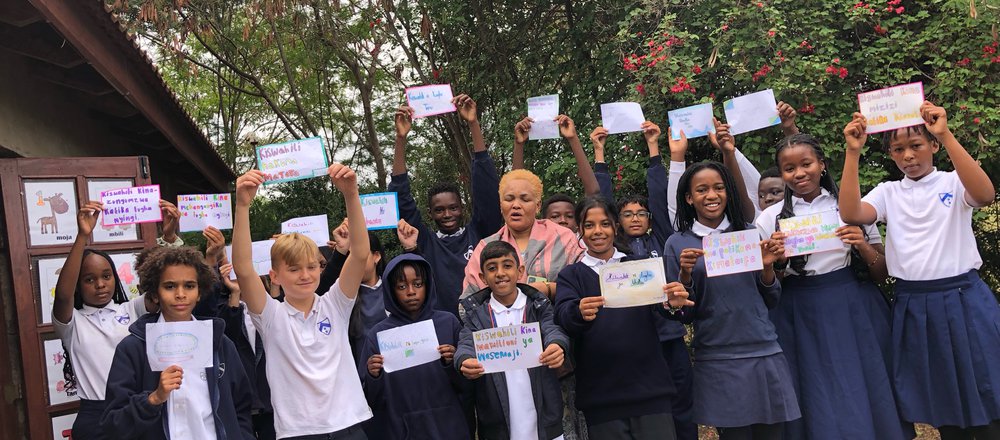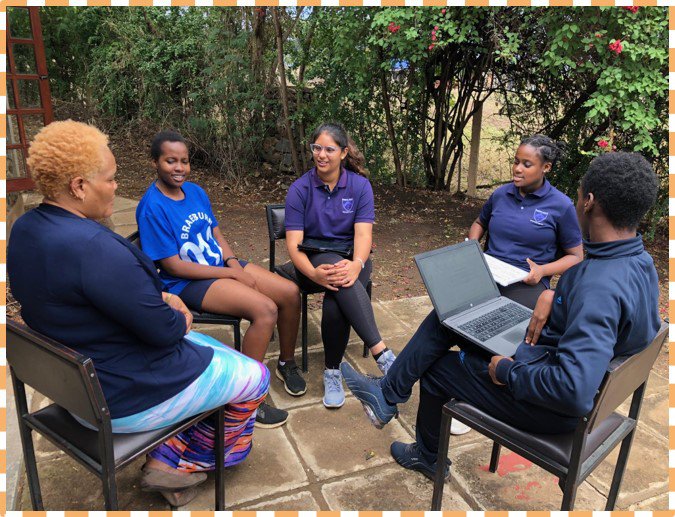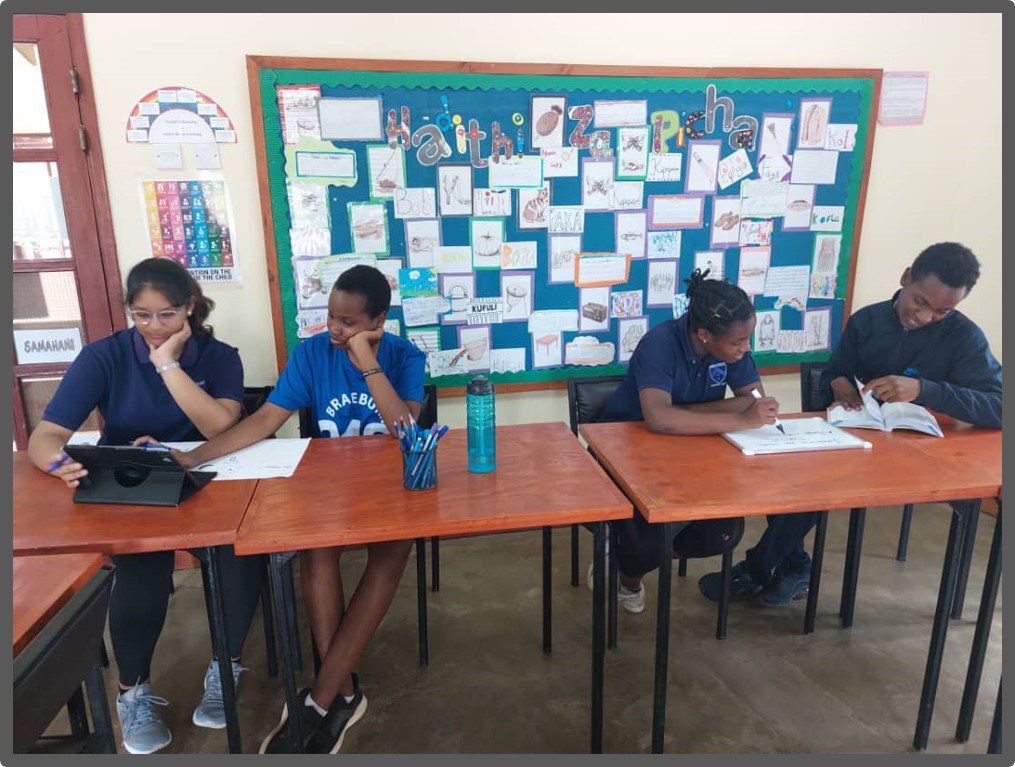
A peek into our bustling Languages Department

24th March 2023
"The limits of my language mean the limits of my world." - Ludwig Wittgenstein
Learning new languages can have many benefits, both practical and personal:
- Communication: Knowing another language can help you communicate with people from different cultures and backgrounds. It can also help you understand their perspectives and experiences.
- Career Opportunities: Learning a new language can enhance your career opportunities, especially if you work in fields such as international business, diplomacy, or tourism.
- Brain Health: Learning a new language can keep your brain active and improve cognitive function, memory, and problem-solving skills.
- Cultural Understanding: Learning a new language can help you gain a deeper understanding of other cultures, including their customs, values, and beliefs.
- Personal Growth: Learning a new language can be a challenging but rewarding experience that can boost your confidence and self-esteem.
- Travel: Knowing another language can make traveling to foreign countries more enjoyable and immersive, as you can communicate with locals and better navigate your surroundings.
Learning new languages can broaden your horizons, expand your worldview, and improve your communication skills, making it an important skill to develop. Let's take a look at how our BISA students are progressing in their language learning!
Swahili Update:
In today’s connected world, it is more important to understand, speak and write in a second language than ever before. As children learn a language in addition to their mother tongue, not only does it develop their brain power and memories, it opens career paths, makes travelling safer and helps them become truly international.
When choosing an international school for your children, it’s important to look at the importance placed upon learning additional languages. Before delving into your school research, however, it’s important to comprehend the benefits of having an additional language. Exposing students to languages other than their mother tongue provides an insight into and an appreciation of other cultures, and an awareness of other perspectives.The acquisition of an additional language is key to promoting an international understanding.
At BISA all students from Creche to Year 8 must learn Kiswahili. Learning Kiswahili within the host country opens the door of communication between people of different cultural backgrounds and develops a better understanding of the Tanzanian society, history, culture and traditions, allowing BISA students to create a deeper connection to their local community.
When you graduate from university, job prospects will look at where you attended school, your extra-curricular activities, any volunteer work and whether or not you are multilingual. The acquisition of a new language requires an understanding of foreign rules, structures, cultural concepts, vocabulary and sounds. It requires students to start from the beginning and patiently work through the basics.
At BISA language lessons are animated and enhanced with songs, rhymes, stories, games, films, role-playing, cooking and local cultural events as it helps students absorb more information. By communicating effectively through the good use of language skills, we can explain and understand each other’s perspectives.
Enjoy this insight into our Key Stage 3 and 4 IGCSE class as they display their proficiency:
Pauline Sekemi


French Update
We are pleased to share with you what is happening in your children's French A Level classes. Currently, we are preparing our students for a literature exam that requires intensive study of a particular book: "The Stranger" by Albert Camus. This book is an important read in French literature and is considered a significant challenge for students. However, we are convinced that this book is exciting and will allow our students to acquire a deep knowledge of French literature.
During this preparation period, students must read the book and describe the main character, who is the narrator and a complex and unusual personality. We believe that this represents a real challenge for our students as it involves a complete understanding of the book and the ability to draw solid conclusions and write essays comparing the characters and absurd scenes in the book. However, we are confident that our students are capable of rising to this challenge.
We are convinced that this reading will allow our students to discover new facets of French literature and inspire them in this field. Of course, we are aware that this task is not easy for our students, but we have taken the time to break down each lesson so that every student can understand it to the fullest and be able to put their ideas into writing.
We are confident that this preparation is a real challenge for our students, but we are proud to accompany them on this adventure so that they can achieve excellent results.

Nous sommes heureux de partager avec vous ce qui se passe dans les cours de français de vos enfants et particulièrement pour les élèves des années A level. Actuellement, nous préparons nos élèves pour un examen de littérature qui nécessite une étude intensive d'un livre particulier: "L'Étranger" d’Albert Camus. Ce livre est une lecture importante en littérature française et est considéré comme un défi de taille pour les étudiants. Cependant, nous sommes convaincus que ce livre est passionnant et qu'il permettra à nos élèves d'acquérir une connaissance profonde de la littérature française.
Pendant cette période de préparation, les élèves doivent lire le livre et en décrire le personnage principal, qui est le narrateur et un personnage complexe hors du commun. Nous croyons que cela représente un véritable défi pour nos élèves car cela implique la compréhension totale du livre et la capacité de tirer des conclusions solides ainsi que des dissertations comparant les personnages et les scènes absurdes du livre. Cependant, nous sommes convaincus que nos élèves sont capables de relever ce défi.
Nous sommes persuadés que cette lecture permettra à nos élèves de découvrir de nouvelles facettes de la littérature française et de les passionner pour ce domaine. Bien sûr, nous sommes conscients que cette tâche n'est pas facile pour nos élèves, mais nous avons pris le temps de décortiquer chaque leçon afin que chaque élève puisse comprendre au maximum et être capable de mettre leurs idées par écrit.
Nous sommes convaincus que cette préparation est un réel défi pour nos élèves, mais nous sommes fiers de les accompagner dans cette aventure pour qu'ils puissent obtenir d’excellents résultats.
Barbara König
English
This week in Year 13 literature, we took a dive into the culture of Victorian England. Students have been studying the play The Importance of Being Earnest by Oscar Wilde, in which we see the character of Algernon continuously stuff his bottomless pit of a stomach with English muffins. Since no one in class had ever had an English muffin before, we set up a miniature picnic to try them, complete with toasting, butter, and homemade peach jam. Understanding the attitudes, behaviours, and practices of the time period enhances understanding of the piece as a whole, and now we all have a new appreciation for why Algernon couldn't keep his hands off of these delightful treats.
Christie Harrison






